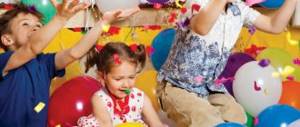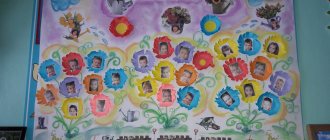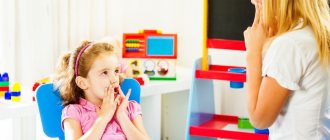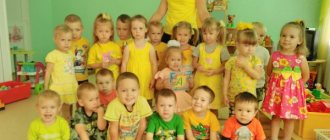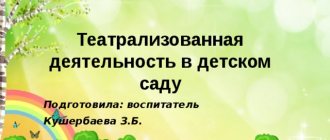“Organization of preschool teachers into creative micro-groups.”
Materials from experience in organizing creative groups of teachers.
The Russian preschool education system is currently actively developing. Modern society makes new demands on preschool educational institutions, on the organization of the educational process in them, the selection and justification of the content of programs, methods and technologies, the results and effectiveness of their activities, the selection and training of teaching staff.
With the introduction of the Federal State Educational Standard for Preschool Education, the need arose to update and improve the quality of preschool education, increase the level of professionalism of preschool teachers, introduce software methodological support for preschool education of a new generation, aimed at identifying and developing the creative and cognitive abilities of children, as well as leveling the starting opportunities for graduates of preschool educational institutions during the transition to a new age stage of systematic schooling. Modernization of the education system entails significant and qualitative changes in the work practices of teachers and in the organization of methodological work in preschool educational institutions.
The modern situation is characterized by an awareness of the high importance of not just a human resource, but an effectively acting person for planning and implementing socio-economic changes. The development of an education system forced to respond to the challenges of the time is possible only if the teaching staff is highly competent. Teachers of preschool educational institutions have always been particularly receptive to everything new. However, the most wonderful ideas and initiatives in the education system can be lost due to the lack of professionalism of the teacher.
Today, more than ever, society’s demands for the quality of education and pedagogical professionalism have increased, and this implies a change in the content and forms of improving the professional level of teachers. The main objectives were: ensuring a higher level of pedagogical competence.
The professionalism of a teacher is an integral education, which includes the systematic manifestation of knowledge, skills, abilities and personal qualities that allow one to successfully set and solve functional tasks, provide information content for teaching activities, and develop programs.
Currently, not just a teacher is in demand, but also a teacher researcher, educational psychologist, and educational technologist. These qualities of a specialist after graduating from a pedagogical university or pedagogical college can only develop in the conditions of a creatively, problematically and technologically organized educational process in a preschool institution. Moreover, provided that the teacher is actively engaged in scientific-methodological, search, innovative work, learns to look for his “professional face”, his pedagogical tool.
It would be logical to build three directions:
In relation to the general education system
This direction includes familiarization and elaboration of regulatory documents, implementation of scientific achievements and best practices. A system of advanced training for teachers (self-education, self-development and all forms of methodological work) is being systematically developed.
In relation to a specific teacher
Here the main task is the formation of a personal, authorial, effective system of pedagogical activity of the teacher. Methodological work is aimed at expanding and updating the teacher’s knowledge and developing creative activity.
In relation to the teaching staff of the kindergarten
Methodological work aims to form a friendly team of like-minded people, special traditions, personal guidelines, control and analysis of the educational process; identification, study and generalization, dissemination of significant best practices.
As confirmation of the effectiveness of the work of the preschool educational institution, the process of education and training is constantly being improved. Analyzing the activities of the team to create conditions for the positive stay of children in the kindergarten, the development of the personality of each child, problems and contradictions between “what is” and “what should be” are highlighted.
Based on the results of monitoring the state of the educational process, pedagogical analysis as the essence of the formation and regulation of the pedagogical process:
- collecting status information;
- analysis of collected information;
- issuance of information for implementation.
Pedagogical analysis is not the identification of shortcomings; the main thing in its implementation is the search for the quality of work, the pedagogical characteristics of each teacher and everyone in general. The difficulty lies in the fact that the object of analysis is a person, therefore, it must be carried out with a high management culture, tact and goodwill. By involving the teacher in self-analysis of his activities, teaching the ability to evaluate the difficulties of work for himself, the methodological service thereby increases pedagogical activity, which means professional skills grow.
The difficulty of the analysis lies in the fact that not every teacher is ready for an objective assessment of their practical activities; more often they give underestimated self-esteem, while others give overestimated ones. Therefore, you can practice mutual checks, which help build self-respect and self-worth.
When preparing and conducting pedagogical analysis, you can use reminders for viewing and analyzing routine moments and classes. When compiling a memo, it is necessary to highlight important issues, clearly arrange them in a certain sequence, and determine their compliance with the objectives of the observations. Memos should be very specific and small in volume. Pedagogical analysis requires an intellectual approach to the individual, skillful analytical thinking.
The conversation itself with the teacher should be based on goodwill, respect, be tactful, and rely on positive aspects. When planning a conversation, it is important to take into account the individual characteristics of a person: character, type of nervous activity, experience, degree of pedagogical skill, general outlook, erudition.
All forms of methodological work can be divided into two interrelated groups:
Group forms - mutual visits, consultations, seminars and workshops, creative and working groups, business games, exhibitions and, of course, teacher councils.
Individual forms – internship, interview, self-education, mentoring.
“Creative group as an interactive form of work for preschool teachers”
Ministry of Education and Science of the Republic of Mari El
State Budgetary Educational Institution of the Republic of Mari El "OMK named after. I. K. Glushkova"
Interregional Scientific and Practical Conference XVII Glushkov Readings
“Humanization of the educational space: experience, problems, prospects”
N.Yu. Bragina
Educator,
MDOU No. 5 “Fairy Tale”
RME Kozmodemyansk
“Creative group as an interactive form of work for preschool teachers”
Orshanka village, 2018
Among the effective forms of methodological work in a preschool educational organization are:
Master classes; round tables; discussions; project workshops; case technologies; role-playing and business games; quizzes and work in “Creative groups”.
The work of educators in “Creative Groups”, as an interactive form of work with teachers, allows you to create conditions for independent and creative activity of its participants, increase their pedagogical competence, develop creative initiative, creative thinking, the ability to work collectively, cooperate fruitfully with each other, and find a non-standard way out from a problematic situation.
Each member of the “Creative Group”, using their personal experience, acquires new collective experience in free activity.
Another feature of the “Creative Group” is the implementation of the idea of dialogue in all its aspects. There is an exchange of opinions, knowledge, and creative finds between members of the creative group, which is facilitated by the alternation of individual, group activities and work in pairs.
The result of the work is not only real knowledge or skill, but the process of creating a creative product itself is important. At the same time, the most important quality of the process is cooperation and co-creation.
Work in “Creative groups” can be used in various areas of education, both in working with educators and with children.
Work algorithm:
"Creative group"
"Inductor"
Motivation of participants' activities. When working with educators, this is a theoretical block of information that activates in the mind the basic principles of the issue and personal experience that has developed in this area. For this purpose, visual aids are used: information and communication technologies. To update the personal experience of the participants of the “Creative Group”, to activate the imagination, to develop the creative process of everyone’s activity, associations are used. It is a spontaneous combination of ideas, perceptions, images, fantasies in accordance with certain personal and psychological themes, motives, similarities, opposites or causal relationships.
"Creating a creative product"
Deconstruction - destruction, separation, mismatch of materials. With the help of reconstruction from different parts, units, a whole new phenomenon, representation, knowledge is created, which is presented to the group and all participants.
"Socialization"
Presentation of the created product to all participants. Combining individual results, teamwork. Socialization allows you to understand the direction. methods of activity of other participants, correlate results, evaluate ideas and hypotheses.
“Reflection and reaching a new system of problems”
Understanding the creative process. designing, acquiring new knowledge, awareness of one’s internal changes, one’s intellectual and emotional movement.
As a result of the work of teachers in “Creative groups”, despite the solution of the task. New problems are certainly identified that require resolution.
In our kindergarten, five “Creative groups” began working in 2020. In which teachers united according to their desires, interests, preferences in a particular educational area of child development.
“Creative groups” study, analyze and implement work in five areas of development in kindergarten practice in accordance with the Federal State Educational Standard for Education.
Social and communicative development, physical development, speech development, artistic and aesthetic development, cognitive development.
Groups have leaders. Each group has its own name.
“Umka” social and communicative development.
"Mosaic" artistic and aesthetic development.
“Inquisitive” cognitive development.
“Speech therapy lounge” speech development.
“Healthcare educators” physical development.
I am the leader of this creative group. All five groups work according to an algorithm. Team leaders and members receive assignments. And the brainstorming begins. Each team, led by a leader, develops an action strategy. Another way to say it is “to create.” The competitive spirit of the “Creative Groups” reveals new abilities and opportunities in teachers. Helps in the creative organization of the pedagogical process.
List of sources:
- Artemyeva, O.I. Forms of methodological work with teachers of preschool educational institutions [Electronic resource] https://planetadetstva.net/vospitatelam/pedsovet/formy-metodicheskoj-raboty-s-pedagogamidou.html
- Chernukhina, I.N. Educational and methodological course Interactive forms of working with teachers [Electronic resource]
https://nsportal.ru/detskiy-sad/upravlenie-dou/2014/01/17/interaktivnye-formy-raboty-s-pedagogami
Creative group work plan
Work plan of the MBDOU creative group
"Kindergarten No. 33"
for 2020 – 2020 academic year
Developed by: Shevchenko O.V. - teacher
highest qualification category
Slavgorod 2015
Goal: introduction of innovative technologies into the educational process, improving the quality of preschool education, the level of professional skills of teaching staff within the framework of the implementation of the Federal State Educational Standard.
Objectives: creating conditions for professional communication between preschool teachers and developing their creative activity; inclusion of preschool teachers in the innovative process of educational activities.
| № p/p | Events | Tasks | Form of conduct | the date of the | Responsible for the event |
| 1. | Discussion of the creative group’s work plan for the academic year. | Discuss the proposed plan and make additions. | Round table (discussion). | September | Shevchenko O.V. |
| Preparing for Preschool Worker's Day. | Preparation of the program. | Festive concert for preschool employees. | September | Music worker, preparatory group teachers | |
| 2. | The place of the project in the educational process of preschool educational institutions. | Training of teachers in project activities. | Consultation | October | Senior teacher |
| The importance of project activities in the work of preschool educational institutions. | Improving the skills of teachers in writing projects. | Round table (workshop) | October | Educators, Art. teacher | |
| Preparing for the Day of the Elderly. | Preparing for the holiday. | Celebration for the Day of the Elderly. | October | Music leader, senior group teachers | |
| Exhibition “The summer is over” | Design of a photo exhibition. | Photo exhibition | October | Educators | |
| 3. | The project method as the basis of pedagogical interaction with preschoolers. | Introduction of the project method into the work of teachers. | From the experience of “Experts of the design method” | november | Educators |
| Organizing a reading competition for Mother's Day. | Preparing children for the competition. | Reading competition. | november | Educators | |
| Organization of the exhibition “My Mother” | Design of a photo exhibition | Photo exhibition “My Mother” | november | Educators | |
| 4. | Systematization of health work. | Determination of the “nearest zone” of the child’s health (optimal opportunities for the development of important motor skills and dosage of physical activity). | Monitoring the health and physical development of children. | December | Educators, Art. teacher |
| "I'm growing, I'm developing" | Planning physical education and health work. | Creation of a project for physical education and health work “Be healthy without doctors!” | December | Educators, Art. teacher | |
| Development of a long-term physical education and health project. | Preparation of project presentations. | Presentation of projects. | December | Educators |
Pedagogical Council
When planning a pedagogical council, we must remember that this is a permanent and collegial body of self-government for teaching staff. He considers:
- Issues of optimization of the educational process;
- Approves and adjusts plans, work programs, creative projects, personal plans for self-education;
- Makes collegial decisions;
- Improves the professional qualifications of teachers;
- Determines ways and forms of updating preschool education in a particular institution;
- Provides an analysis of the quality of knowledge, skills and abilities of pupils, the level of work of teachers, the development of the kindergarten itself, and improving its rating in the region;
- Summarizes the activities of the preschool institution and the achievement of the goals set by the team.
The pedagogical council in modern times has become multifunctional. Its functions:
- planning and prognostication;
- motivational-target;
- information and analytical;
- diagnostic;
- communication;
- methodical.
The value of these functions is determined depending on the focus of each specific pedagogical council.
The new socio-economic situation, new legislative documents put new requirements at the forefront. Since the pedagogical council is a collegial management body, it is called upon to change old pedagogical ideas and guidelines. Mastering something new involves both interconnection and further development of everything positive and advanced that traditional approaches contain.
A thinking Council of Teachers necessarily finds a way out of current situations and contradictions. He makes rational decisions leading to better pedagogical results, thinks positively, outside the box and independently.
The Institutional Pedagogical Council undertakes the most difficult mission:
- creating conditions for revaluation of pedagogical values. Education and training are more effective where there is a constant interest of adults in the child. For a teacher, the child’s personality is paramount and the main object of his care. Children change, values change.
- Changing opinions, views, judgments, ideas about the child, about one’s professional purpose.
- Awakening desires to learn to teach and educate in a new way.
The purpose of the final teachers' council is to identify strategic and developmental problems. The only way to move forward and achieve success is to identify and correctly understand your problems in time. Problem analysis can be carried out according to the “from end to beginning” scheme:
- Analysis of the results: what is not satisfactory in the results? What is the degree of inconsistency between what is and what should be?
- Analysis of the educational process, i.e. what shortcomings create a discrepancy between what is and what should be?
- Analysis of conditions, i.e. Deficiencies of what conditions are the causes of defects in the educational process?
Such an analysis allows you to remove problems that are not significant for the final result and leave only the most significant ones in the field of view. In order for the conclusions and results of the analysis to be sufficiently reliable and fair, it is necessary to identify, know, and take into account the opinion of each teacher.
The topics of teachers' councils are determined by the annual plan of the preschool institution. However, preparing for a meeting may mean expanding and clarifying the agenda in accordance with the requirements of the current moment. In order for the teachers' council to truly be a governing body, and for its decisions to be effective and contribute to improving work with children, each meeting is preceded by comprehensive preparation.
Each participant prepares for the teachers' council. This means that it is necessary to critically and comprehensively give a self-analysis of your activities on the topic of the teachers’ council. In advance, an exhibition of literature on this topic, the work experience of leading kindergarten or city teachers, manuals, and notes are prepared in the methodological room. Tips and tasks are offered to help you prepare for the meeting itself.
An important point in the work of the teachers’ council is the final word. It should be short, specific, and contain specific proposals.
